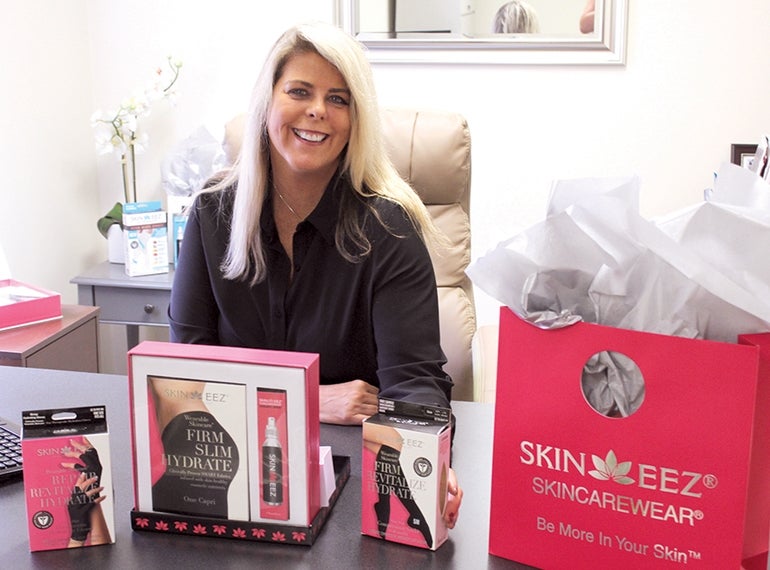Michelle Moran is not a likely master of the skincare and beauty industry, but the Sudbury resident got a hang of it about as quickly as anyone could have.
The former apparel industry worker and single mother launched what is now Skineez in 2008 shortly after undergoing surgery and being given what she describes now as a horrific compression garment, a fabric drying her skin and making recovery painful.
Moran created a do-it-yourself garment that moisturized her skin, something very similar to the Skineez compression socks, leggings and gloves now sitting on shelves in thousands of Walmart, Walgreens, CVS and other stores nationwide.
In an industry dominated by Johnson & Johnson and Proctor & Gamble, Sudbury-based Skineez has managed to grow from 100 stores to 6,000 in two years.
Getting shelf space isn’t just difficult, “it’s impossible,” Moran said.
Jud Hill, an early investor and one of about a half-dozen major investors in Skineez, said he was drawn to working with Moran after meeting her at a social event. After a few decades in private equity, Hill knows the perils of mentioning at a party you’re an investor.
“But she was tenacious,” said Hill, who is part of the British firm Blue Star Capital and now works out of Washington, D.C. “She understood her business and knew how to explain it in a clear and concise way.”
The founder’s persistence
In investing terms, Hill bet on the jockey, and not the horse.
His faith was placed not so much in Skineez but in the woman behind it, who demonstrated a confidence and entrepreneurship showing she was likely to withstand setbacks like those any startup would face.
“She has the tenacity to deal with those challenges,” Hill said.
Moran was persistent in getting people to see her potential from the start.
“People fear getting a ‘No,’ but I don’t,” she said. “If I get a ‘No,’ I can get a ‘Yes’ next time.”
Entrepreneurs need to strike a balance between being determined and open to negotiation, said Frank Hoy, a professor of entrepreneurship and innovation at Worcester Polytechnic Institute.
“There’s no magic where that balance is,” he said.
Hoy called Skineez’s ability to get shelf space in the country’s largest retailers shocking for how difficult it is to be in the same aisle as products from major corporations.
Any new product has to bump off an existing one.
“For someone they’ve never heard of,” he said, “that’s a tough breakthrough.”
Moran, who spent most of her childhood in Maine, first envisioned a career as a broadcaster. She went to UMass Amherst and then the Connecticut School of Broadcasting, but couldn’t make any traction. She was dyslexic.
Moran then worked for Heroes & Legends, a seller of licensed sports memorabilia, and then entered the apparel industry. Moran’s mother worked in cosmetics for Mary Kay and Avon, so the beauty care market was not too foreign. After her surgery, Moran took something already on the market – compression wear that’s been made popular by Under Armor and Lululemon – and applied moisturizer.
This was before the investment show “Shark Tank,” where entrepreneurs can pitch their ideas to investors and a TV audience, and Moran jokes Skineez’s rise would have been even faster if she had been able to get on such a show. But once she got Hill’s ear, she was on her way.
Staying on the shelves
Skineez investors wanted to make sure the product was the real deal, so they invested in third-party clinical trials.
Along the way, Skineez got U.S. Food & Drug Administration approval and was eligible for reimbursement through Medicare and Medicaid. This year, it was approved to be sold to the U.S. military for its skin-repairative abilities. Moran said she hopes to start designing Skineez products for prosthetics.
Skineez products – ranging from $19.99 socks to $48 tights – are infused with shea butter, Vitamin E, rosehip oil and other skin-healing ingredients delivered to the skin through friction. Those ingredients last up to 10 washes, after which a spray can be bought for $10 to $20 to apply more. Eight out of 10 people in trials said they felt smoother skin in an hour, according to the company.
“The fabric is actually delivering it to you,” Moran said.
Skineez has built up enough buzz largely through testimonials it’s been featured on the “Today Show,” in InTouch magazine, and on TV programs in Connecticut and New York. The company bought a billboard in Times Square.
Skineez uses a factory in North Carolina and still operates out of a small 15-person office on Route 20 in Sudbury. It did not disclose financial figures.
Skineez finds itself as a player in the multibillion-dollar beauty care industry. A Groupon study of 2,000 American adults last summer found women spend an average of $3,756 a year on their appearance, and men spend $2,928, totals including gym memberships.
For having so many large players in the beauty care industry, it would seem to be only a matter of time until a Johnson & Johnson makes a similar product – or makes a move for Skineez itself.
“That’s why being a first mover really makes a difference,” Hill said of Skineez bringing such a product before anyone else. As for whether the company might go public or consider selling to a larger competitor, Hill is open-minded.
“Who knows what will be appropriate and when,” he said.
CORRECTION: A previous version of this story incorrectly said that Moran is from Maynard.

